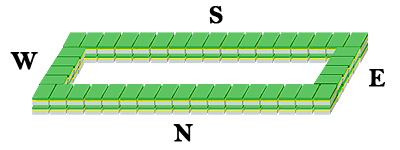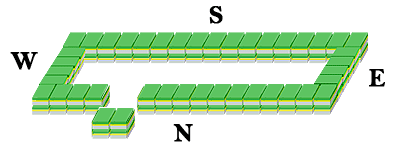Riichi Competition Rules
|
|
2.1 Seat wind
Mahjong is played by four players, each of which is associated with a wind, denoted the
player’s seat wind. East is the starting player. South is sitting at East’s right, West is
sitting across from East, and north is sitting at East’s left. Note that the counter-clockwise
order east-south-west-north is not as could be expected from the compass directions.
During a full game, each player is East at least two times.
|
2.2 Prevalent wind
When the game begins, east is the prevalent wind. When the player who started the
game as East, becomes East again after all other players have played at least one hand as
East, the south round begins, and south is the prevalent wind. A wind marker should
be placed permanently by the player who begins as East, and when this player becomes
East again after the first (east) round of the game, the marker is flipped to indicate the
new prevalent wind, south.
|
2.3 Seating at the table
The players’ positions at the table are determined by drawing lots if they are not predefined
by a tournament schedule.
|
2.4 Building the wall
The tiles are thoroughly mixed. Each player builds in front of himself a wall of face-down
tiles, seventeen tiles long and two tiers high. The four walls are pushed together to form
a square.
|
 |
2.5 Breaking the wall
East rolls two dice and counts that number of players counter-clockwise, starting with
himself. The player thus determined breaks the wall in front of him, by counting from
the right the same number of tiles as the indicated by the dice. After the last counted tile, the wall is broken by pushing the two wall sections a bit apart. If East’s dice roll was 12,
North breaks the wall as shown:
|
 |
2.6 The dead wall
The seven tile stacks to the right of the break make up the dead wall. The dead wall
continues around the corner to the next wall, if the end of the wall is reached. After the
seventh tile stack, the two sections of the wall are pushed a bit apart to set the dead wall
apart from the end of the wall. The tiles in the dead wall are not used in the play, except
for the providing of replacement tiles for kongs.
|
2.7 The dora indicator
Count three tiles into the dead wall from the original break in the wall, and turn the top
tile over to determine the dora indicator. This tile indicates which tile is dora. If the dora
indicator is a suit tile, the dora is the next tile in the same suit, e.g. seven bamboo is dora
if six bamboo is the dora indicator. If the indicator is a nine, the dora is the one in the
same suit. If the indicator is a dragon, the dora is also a dragon, as the following order
applies: red points to white, white points to green and green points to red. For winds,
likewise, the following order applies: east-south-west-north-east.
|
 - is dora when the indicator is -
- is dora when the indicator is -
      
 - is dora when the indicator is -
- is dora when the indicator is -
      
 - is dora when the indicator is -
- is dora when the indicator is -
      
 - is dora when the indicator is -
- is dora when the indicator is -
      
|
|
2.8 The deal
The player who is East takes the first four tiles in the wall after the original break in
the wall. Tiles are taken clockwise, while the players’ turns proceed counter-clockwise,
South takes the next four tiles, West the next four, North the next four and so on until all players have twelve tiles. East continues by taking two tiles: the top tiles in the first and
third stacks in the wall*. South,West and North each take one tile in order. East now has
a starting hand of fourteen tiles, whereas the other players have thirteen tiles.
|

|
Each player arranges his tiles upright in front of himself, so only he can see the faces.
The dice are placed at East’s right; in this way it is always clear to all players which player
is East.
* This corresponds to East taking one tile, waiting for the other players to take one tile each, and then East
takes his fourteenth tile.
|
| |
|
Предыдущая 1 2 3 4 5 Следующая |